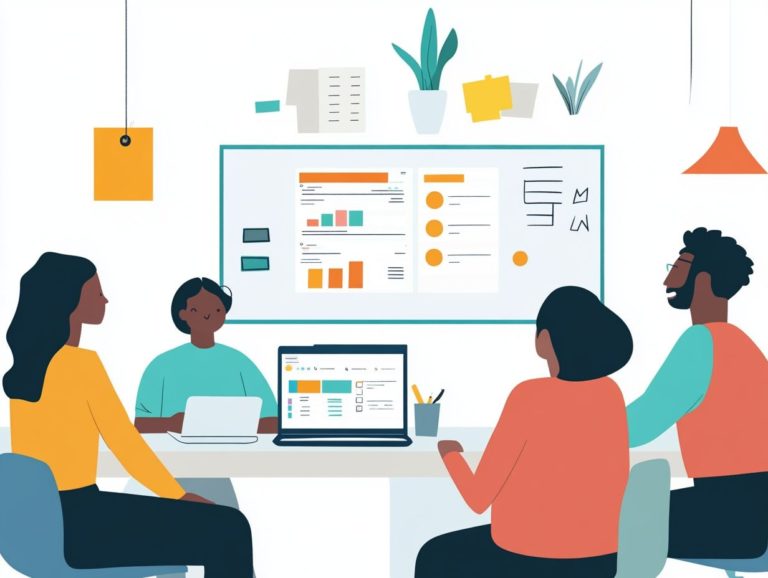97. 5 Key Features Every Nonprofit CRM Should Have
Navigating the complexities of nonprofit management can feel overwhelming. However, with a robust Customer Relationship Management (CRM) system at your disposal, you can revolutionize how your organization operates. Get ready to transform your organization!
This article delves into five essential features that every nonprofit CRM should encompass. It covers effective donor management, volunteer management, thorough reporting, and analytics. It also highlights the critical importance of these tools for nonprofits, offers guidance on selecting the right CRM, and addresses common challenges you may encounter during implementation.
By the end, you ll clearly see how a CRM can drive impactful change in your organization.
Contents
Key Takeaways:

Donor management, volunteer management, event management, grant management, and reporting are the key features every nonprofit CRM should have.
A nonprofit CRM helps streamline processes, improve donor relationships, and increase efficiency for nonprofits.
When choosing a CRM, nonprofits should prioritize features such as customizable data fields, integration capabilities, and a user-friendly interface.
1. Donor Management System
A robust Donor Management System is essential for nonprofit organizations like yours. It gives you the power to effectively track donor profiles, manage donations, and automate key processes such as billing and donor engagement. This is done using advanced reporting tools to make informed decisions.
This system not only optimizes your fundraising efforts by providing insights into significant gifts and recurring donations. It also enhances your communication strategies through personalized outreach tailored to each donor’s unique journey.
By seamlessly integrating with CRM technology, your donor management system ensures that every interaction is recorded and accessible. This allows you to implement more effective engagement strategies.
Essential features include:
- Automation options for sending thank-you notes
- Reminders for upcoming events
These significantly reduce your manual workload and enable you to focus on nurturing relationships. With segmentation capabilities, you can target specific donor groups, maximizing the effectiveness of your campaigns.
You can also track major gifts and generate detailed reports. This equips your team with invaluable data, helping you refine your approaches and uncover new funding opportunities.
2. Volunteer Management
Effective volunteer management is essential for nonprofits. It streamlines recruitment and engagement processes while cultivating a robust sense of community among volunteers. This ensures that they feel valued and are given the power to make meaningful contributions to the organization s mission.
By utilizing dedicated volunteer management systems, you can simplify various operational aspects. This includes tracking volunteer hours and organizing events with ease. These systems also facilitate the training of new volunteers, providing resources that help them acclimate swiftly and efficiently.
Integrating technology tools can significantly enhance your communication efforts. For instance, employing Customer Relationship Management (CRM) software fosters improved outreach, enabling you to connect with volunteers and community members on a deeper level.
This integration enriches the volunteer experience and amplifies community engagement, ensuring that the impact of their collective efforts is maximized.
3. Event Management
Event management is a crucial element of your nonprofit operations. It gives you the power to plan and execute successful fundraising events that not only generate revenue but also enhance community engagement. It nurtures relationships with major donors through tailored marketing strategies.
This multifaceted process demands careful planning, where every detail is meticulously considered everything from venue selection to budgeting.
Your marketing efforts are instrumental in attracting attendees and creating excitement. Utilize social media and email campaigns to effectively engage potential donors. During the execution phase, seamless coordination guarantees that everything runs smoothly, ensuring an enjoyable experience for all participants.
Post-event analysis is vital for assessing the success and pinpointing areas for improvement. By leveraging CRM and automation tools, you can streamline tasks such as registration and donation tracking. This ensures that donor engagement remains robust throughout the entire lifecycle of the event.
4. Grant Management

Grant management is crucial for nonprofits like yours that are on the hunt for funding opportunities. It involves carefully tracking applications, managing deadlines, and reporting on the impact of the grants you receive.
This ensures you comply with grantor requirements while optimizing the funding process through effective communication strategies. Implementing a structured grant management system enhances your organization s ability to remain organized and proactive in pursuing funding.
It allows you to maintain a comprehensive overview of submitted applications and their respective deadlines. This ensures that you can effectively monitor the success of your funded initiatives. Using a dedicated Customer Relationship Management (CRM) tool, which helps organizations manage their relationships with supporters, can elevate this process even further.
This feature streamlines communication with grantors, automates follow-up reminders, and generates insightful analytics that reveal your funding success rates. It empowers you to refine your strategies, ultimately leading to more sustainable funding outcomes.
5. Reporting and Analytics
Robust reporting and analytics capabilities are essential for nonprofits, offering valuable insights into fundraising metrics, donor engagement, and your organization s overall impact. This data gives you the power to make informed, data-driven decisions that optimize your outreach efforts and enhance transparency with stakeholders.
To fully unlock this potential, prioritize generating comprehensive financial reports that outline your income sources and expenditures. Understanding donor demographics and behaviors helps you craft tailored engagement strategies that foster stronger relationships with your supporters.
Analyzing fundraising metrics helps you assess the effectiveness of your campaigns and make necessary adjustments with confidence. By leveraging data analytics, you can refine your strategic planning and elevate your community outreach initiatives, ensuring your message resonates with the right audience while maintaining accountability and trust within your community.
Why Is a CRM Essential for Nonprofits?
A CRM is essential for nonprofits, acting as the cornerstone of effective donor management. It gives you the power to automate communication, track donor interactions, and coordinate fundraising efforts seamlessly enhancing community engagement and strengthening donor relationships, ultimately propelling your mission forward.
Beyond refining donor relations, a robust CRM system is vital for event tracking and volunteer engagement. By consolidating information, you can efficiently monitor event attendance and gather participant feedback, ensuring future events resonate more deeply.
It also streamlines volunteer management by maintaining records of volunteer hours and skill sets, helping you match tasks to individual capabilities more effectively.
These platforms enhance data accuracy and accessibility while streamlining communication, ensuring your messages reach the right people at just the right moment. This supports more effective fundraising strategies through automation and insightful data analysis.
What Are the Benefits of Using a Nonprofit CRM?
Using a nonprofit CRM offers a wealth of benefits, from streamlined donor engagement to enhanced reporting capabilities and automated communication strategies. These features collectively elevate your fundraising efforts and improve relationship management with both donors and volunteers.
By centralizing your data, you can effortlessly track donor interactions and preferences, allowing for tailored outreach that fosters loyalty and boosts donation levels. Enhanced reporting functionalities give you the power to analyze trends and measure campaign success effectively, providing valuable insights that inform your future strategies.
Automation becomes your ally here, minimizing repetitive tasks and freeing your staff to focus on mission-driven activities instead of getting bogged down by administrative burdens.
For example, when you automate thank-you emails, you ensure timely communication while your team dedicates their energy to organizing community events or developing outreach programs, ultimately amplifying your impact in serving the community.
Ready to elevate your nonprofit’s impact? Start using a CRM today!
How Can a Nonprofit Choose the Right CRM?

Choosing the right CRM starts with understanding your organization’s unique needs. Evaluate essential features to ensure the software is user-friendly and customizable.
Start by clearly defining your requirements, such as donor management and reporting tools. This clarity will guide your selection process.
Research the features available in the market. User feedback, through reviews and testimonials, offers invaluable insights into real-world software performance.
Customization is key. Tailoring the CRM to fit your workflows enhances efficiency and creates a seamless data management experience.
What Are the Most Important Features to Look for in a Nonprofit CRM?
Selecting a nonprofit CRM requires considering features that will elevate your organization s efforts. Look for strong data management capabilities and automation tools to improve efficiency.
These features help you engage better with supporters and refine your fundraising strategies. For instance, solid data management allows you to segment your donor base for tailored communication.
Automation tools streamline email campaigns and follow-ups, giving your team more time to focus on strategic planning.
Advanced reporting functions provide insights into fundraising trends, helping you make data-driven decisions. Effective donor profile management nurtures relationships, fostering loyalty and encouraging repeat donations.
How Can a Nonprofit Maximize Their Use of a CRM?
Maximize your CRM s potential by focusing on staff training and regular data assessments. This approach enhances donor engagement and streamlines operations.
Regular training empowers your team to utilize the CRM effectively, extracting valuable insights from data. Create a culture of continuous improvement through routine reviews of your communication strategies.
By analyzing real-time analytics, you can engage more meaningfully with donors, maximizing your impact.
What Are the Common Challenges Nonprofits Face When Implementing a CRM?
Nonprofits face challenges like resistance to change and insufficient training when implementing a CRM. These hurdles can hinder user adoption and limit the CRM s effectiveness.
Address these issues with comprehensive training that highlights the CRM’s benefits for your mission. Involving team members in the selection process can foster ownership of the new system.
Maintaining data integrity is crucial. Conduct regular audits and establish clear protocols for data entry to ensure accuracy and improve reporting capabilities.
Frequently Asked Questions

What is a nonprofit CRM?
A nonprofit CRM stands for Constituent Relationship Management. It s a software tool that helps organizations manage their relationships with supporters, including donors and volunteers.
Why is it important for a nonprofit to have a CRM?
A nonprofit CRM tracks and analyzes data. It streamlines communications and strengthens relationships with donors and volunteers.
What are the key features every nonprofit CRM should have?
The 97.5 key features include donor management, fundraising tools, volunteer management, marketing capabilities, and reporting options.
How does donor management work in a nonprofit CRM?
Donor management tracks donor information, donation history, and preferences. It also identifies potential major donors and tracks fundraising success.
Can a nonprofit CRM help with volunteer management?
Yes, many CRMs have volunteer management features. These include scheduling, tracking hours, and communicating with volunteers.
Why are reporting and analytics important for a nonprofit CRM?
Reporting and analytics let organizations track donor and volunteer data. This helps you spot opportunities for growth and make informed decisions.






